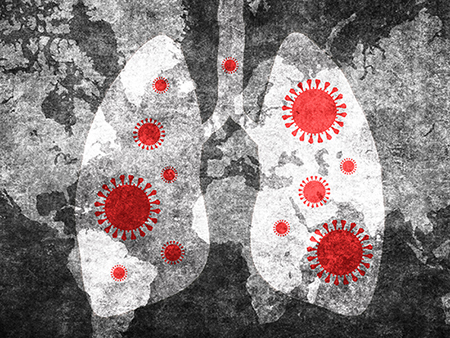
BIRMINGHAM, Ala. – The University of Alabama at Birmingham has been selected to begin enrolling patients in an international study assessing the use of inhaled nitric oxide (iNO) to improve outcomes for COVID-19 patients with severely damaged lungs.
Currently, there are no approved treatment options available against the SARS-CoV-2 virus, which causes COVID-19, although many medications are currently being tested to see if they may be effective. Acute respiratory distress syndrome, a severe form of lung failure, is the leading cause of death in COVID-19.
iNO has been used for the treatment of failing lungs, but it was also found to have antiviral properties against coronaviruses. The antiviral effect of iNO was tested and demonstrated during the 2002-2003 SARS pandemic, which was caused by a similar coronavirus called the SARS-CoV virus.
When lungs are failing, some parts of the lungs receive air while some do not. iNO is a gas that improves the blood flow to those areas of the lung that are receiving air, boosting the amount of oxygen circulating in the blood stream. It also reduces the work of the right side of the heart, which is under extreme stress during conditions of lung failure, such as severe COVID-19 infection.
With the start of this trial, any COVID-19 patient who is admitted to UAB’s ICU and is breathing with the assistance of a ventilator may potentially qualify for the study.
“This trial will allow the sickest COVID-19 patients at UAB access to a rescue therapy that may have antiviral benefits in addition to improving the status of lungs,” said Vibhu Parcha, M.D., a research fellow with UAB’s Division of Cardiovascular Disease.
Pankaj Arora, M.D., assistant professor in the division, is spearheading UAB’s efforts in providing this treatment option to eligible COVID-19 patients. The mechanism of benefit of iNO could be the direct antiviral effect as shown in the SARS 2003 pandemic, modulation of oxidative stress, or improvement of the ventilation perfusion matching in the lungs, Arora says. His group plans to study the cardiovascular effects of high-dose inhaled NO in an ancillary effort to the primary clinical trial.
“In humans, nitric oxide is generated within the blood vessels and regulates blood pressure, and prevents formation of clots and also destroys potential toxins,” Arora said.
The UAB team says this pandemic has led to an extraordinary unifying response by the medical community, including ICU physicians, nurses, respiratory therapists, clinical trial specialists, reviewers and medical administrators, allowing for faster than normal approvals for potentially lifesaving research studies.
“The fact that we are able to get this trial started quickly was due to collaborations across specialties and fields of expertise at UAB with the common goal of providing the highest quality of scientifically proven care for our COVID-19 patients,” Arora said. “We are all trying to fight this together, and I hope, with our resilience, we shall overcome these difficult times.”
As the coronavirus pandemic grows each day, the medical community has been working tirelessly to help people infected with COVID-19. For up-to-date information about UAB and how to protect yourself, visit uab.edu/coronavirus.





























